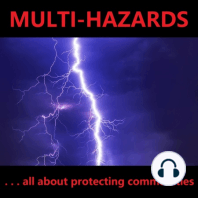51 min listen

Adapting to our Changing Climate: Interview with Dr. Stewart J. Cohen
Adapting to our Changing Climate: Interview with Dr. Stewart J. Cohen
ratings:
Length:
71 minutes
Released:
Jun 14, 2020
Format:
Podcast episode
Description
Can we actually adapt to a changing climate that seems like a runaway train? As the world heats up and nature quickly readjusts itself, how can we survive? In this episode, Dr. Stewart J. Cohen discusses how we predict where the climate is headed and how we can reduce its impacts on society. He discusses how the adaptation process works and how to involve stakeholders. If you want to dive deep into climate change adaptation, here's your chance! Be sure to check out the Study Guide for the program! Click on the top left where it says "Pdf" above the date! https://multi-hazards.libsyn.com/adapting-to-our-changing-climate-interview-with-dr-stewart-j-cohen Also, check out Dr. Cohen's popular blog, Doctor Climate Change: https://doctorclimatechange.com Dr. Stewart J. Cohen's Bio Dr. Stewart J. Cohen is an author and educator on human-caused climate change. Dr. Cohen is currently a part-time instructor on climate change adaptation at Royal Roads University, and is writing posts on his blog mentioned above. His university education was in geography, obtaining degrees from McGill University, the University of Alberta, and the University of Illinois. Dr. Cohen has recently retired from a 35-year research career with Environment and Climate Change Canada. He began his career in Toronto where he created and led studies on the impacts of projected climate change throughout Canada, including the Great Lakes, Saskatchewan River and the Mackenzie Basin. In 1995, as part of a research partnership agreement with the University of British Columbia (UBC), he moved to Vancouver and began developing collaborative projects with the UBC community. He led several climate change impact and adaptation studies of the Okanagan region, and contributed to studies on forests in central and northern British Columbia, and on projected climate impacts and adaptation actions in the Vancouver area. He also created and taught a graduate course, “Climate Change in the 21st Century”. This led to him publishing a textbook with that title in 2009 (McGill-Queen’s University Press). He has been a member of author teams for national assessments of climate change in Canada and the United States, as well as several publications of the United Nations Intergovernmental Panel on Climate Change (IPCC) Working Group II – Impacts, Adaptation and Vulnerability. Photos: Flood: Photo by Chris Gallagher on Unsplash Okanagan Vineyard: Photo by Kelowna09 on Wikimedia Seaside: Photo by Karolina Grabowska on Kaboom Pics Busy Street Scene: Photo by Anubhav Saxena on Unsplash Wave: Photo by Jeremy Bishop on Unsplash Smoke Stack: Photo by Mohri UN-CECAR on Flickr (https://www.flickr.com/photos/66770481@N02/6741179149) California Wildfires: Photo by Bjorgialt on Wikimedia Drought: Photo by redcharlie on Unsplash
Released:
Jun 14, 2020
Format:
Podcast episode
Titles in the series (92)
Tornadoes & Communicating Disaster Risk: Interview with Dr. Justin Sharpe: Multi-Hazards S01 E03 by The Multi-Hazards Podcast